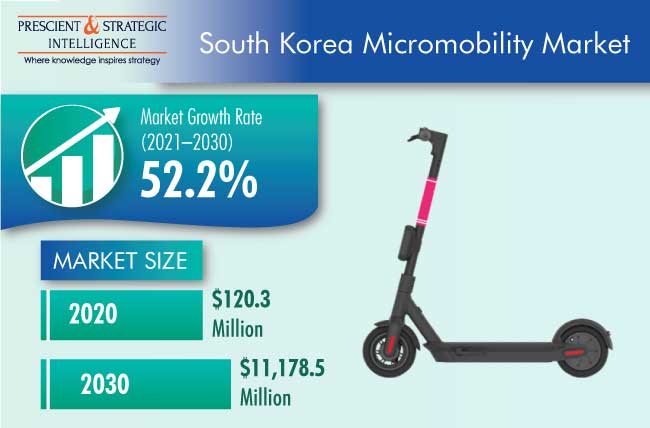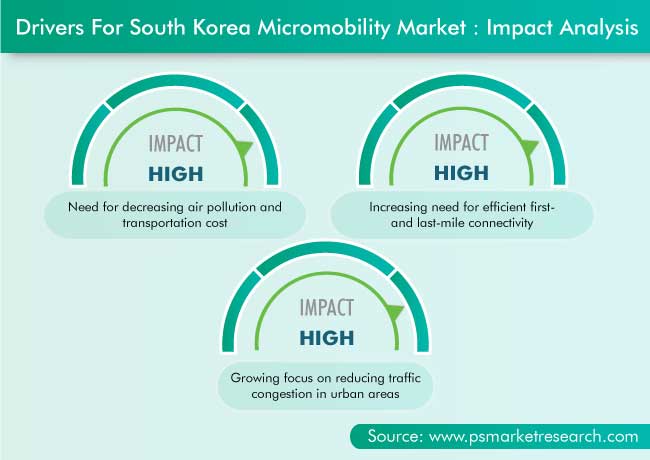Report Code: 12255 | Available Format: PDF | Pages: 100
South Korea Micromobility Market Research Report: By Type (E-Scooters, E-Bikes, E-Mopeds, E-Pods, Bikes, Scooters), Model (First- and Last-Mile, Multimodal), Sharing System (Docked, Dockless) - Revenue Estimation and Growth Forecast to 2030
- Report Code: 12255
- Available Format: PDF
- Pages: 100
- Report Description
- Table of Contents
- Market Segmentation
- Request Free Sample
Market Overview
The South Korean micromobility market generated $120.3 million revenue in 2020, and it is predicted to show a substantial growth rate during the forecast period (2021–2030). The key factors behind the growth of the market are the proliferating focus on reducing traffic congestion in urban areas, need for decreasing air pollution and transportation cost, and increasing demand for efficient first- and last-mile connectivity.
South Korea has suffered from several waves of the COVID-19 pandemic; however, its public health system has been able to combat them effectively by limiting their spread and duration. This was managed through the targeted suspension of public gatherings, closure of public entertainment venues and schools, restrictions on international and domestic travel, and limited use of public transport. However, the pandemic has positively affected the South Korean micromobility market as with fewer people choosing crowded public transit, the demand for alternate means of transport is growing. Micromobility has emerged as one of the most-efficient forms of transportation, with an increasing number of people in the country using it.

E-Scooters Held Largest Share due to Their Cost-Effectiveness
The largest share in the South Korean micromobility market was held by the e-scooters category in 2020, on the basis of vehicle type. This can be ascribed to the fact that e-scooter sharing services have the potential to make a significant contribution to tackling the problem of last- and first-mile commuting, where the existing public transit choices are not as cost-effective. In addition, e-scooters are affordable and accessible, and they are environmentally beneficial since they do not use gasoline or other petroleum-based fuels. These scooters are intended to fit in a tiny space, and they can be used to access public transportation, such as buses and trains.
Dockless Bifurcation To Grow Faster during Forecast Period due to Lower Operational Costs
The dockless system dominated the South Korean micromobility market in 2020, based on sharing system, and it is expected to witness the faster growth in the forecast period. It will mostly be due to an increase in the number of companies opting for the dockless concept over the docked system since the former needs less capital and has lower operational costs. Furthermore, users prefer dockless sharing to docked sharing because of its cost-effectiveness and convenient features, such as greater parking flexibility.
Growing Investments in Micromobility Firms Are Key Market Trends
Due to the growing need for last-mile connectivity, particularly in metropolitan areas, the number of micromobility companies has increased in recent years. Many well-known venture investors and automakers have backed startups in the micromobility space, which, in turn, has helped service providers expand their operations. Some of the leading startups that have raised heavy funding are Lime, Wind Mobility, and Beam Mobility, while some of the leading venture capitalists that have invested in micromobility startups are Sequoia Capital, SoftBank Vision Fund, and DST Global.

Rising Need for Decreasing Air Pollution and Transportation Cost Is Key Driver for the South Korean Micromobility Market
The micromobility ecosystem has grown at an exponential rate owing to the wide availability, low cost, and ease of use of the services. Environmental pollution is presently a major worldwide concern, and South Korea remains one of the most-polluted countries in the world. A study conducted in February 2017 claimed that South Korea had the second-worst air quality of all the advanced economies that are members of the Organisation for Economic Co-operation and Development (OECD). Sustainable energy and the rising use of shared mobility services can contribute to a substantial reduction in the daily fuel consumption, which is driving the usage of micromobility in the country.
| Report Attribute | Details |
Historical Years |
2019-2020 |
Forecast Years |
2021-2030 |
Base Year (2020) Market Size |
$120.3 Million |
Market Size Forecast in 2030 |
$11,178.5 Million |
Forecast Period CAGR |
52.2% |
Report Coverage |
Market Trends, Drivers, and Restraints, Revenue Estimation and Forecast, Segmentation Analysis, Impact of COVID-19, Companies’ Strategic Developments, Company Profiling |
Market Size by Segments |
By Vehicle Type, By Model, By Sharing System |
Secondary Sources and References (Partial List) |
Alternative Fuels Data Center (AFDC), Electric Drive Transportation Association (EDTA), Electric Vehicle Association of Asia Pacific (EVAAP), International Energy Agency (IEA), International Kicksled and Scooter Association (IKSA), International Scooter Association (ISA), Light Electric Vehicle Association (LEVA), Mobility as a Service Alliance (MaaS Alliance) |
Explore more about this report - Request free sample
Market Players Involved in Expanding Their Services across Cities
In recent years, players in the micromobility market of South Korea have involved themselves in service expansion in order to attain a significant position. For instance:
- In March 2021, Neuron Mobility Pte. Ltd. expanded its operations with the launch of a fleet of 2,000 e-scooters in Seoul, South Korea. These e-scooters are fitted with an app-controlled helmet lock, a Follow My Ride feature, which allows users to share their trip with friends and family in real time for more safety, and a 119 emergency button, which can be used to call emergency services in case of an accident. Users have to pay $0.9 (KRW 1,000) to unlock the e-scooter and $0.1 (KRW 150) per minute thereafter. More-frequent users are provided with the option to buy a subscription service, Neuron Passes, available for three days for $7.1 (KRW 8,000), a week for $9.8 (KRW 11,000), and a month for $17.8 (KRW 20,000).
- In February 2021, Elecle, a shared personal mobility platform operated by an e-bike service sharing company Nine to One Co. Ltd., expanded its operation in Osan City in Gyeonggi Province, South Korea. The company launched 150 shared e-bikes in several residential and transportation hubs of the city, such as Osan station, Osan University Station, Sema Station, and the residential pocket of the Unam·Segyo district. The company also signed an agreement with the government of Osan City to introduce, operate, and maintain the shared e-bikes in the city, while the government would oversee the public relations of the launched services, improve the city's bike infrastructure, and support the use of e-bikes.
Key Players in South Korea Micromobility Market Include:
- Kakao Mobility Co. Ltd.
- WIND Mobility Ltd.
- Dart Sharing Co. Ltd.
- Dash Company Co. Ltd.
- Beam Mobility Holdings Pte. Ltd.
- Neuron Mobility Pte. Ltd.
- Olulo Co. Ltd.
- Lime
- G Bike Co. Ltd.
- PUMP Co. Ltd.
- Gogoro Inc.
- Niu Technologies.
- Ningbo MYWAY Intelligent Technology Co. Ltd.
- Kwang Yang Motor Co. Ltd.
- Segway Inc.
Market Size Breakdown by Segments
The South Korean micromobility market report offers comprehensive market segmentation analysis along with market estimation for the period 2019-2030.
Based on Type
- E-scooters
- E-bikes
- E-mopeds
- E-pods
- Bikes
- Scooters
Based on Model
- First- and Last-Mile
- Multimodal
Based on Sharing System
- Docked
- Dockless
In 2030, the micromobility market in South Korea will value $11,178.5 million.
The COVID-19 pandemic affected the South Korean micromobility industry positively.
Dockless sharing systems are more popular in the micromobility market of South Korea because they are cost-effective for service providers and convenient for users.
The major drivers for the South Korean micromobility industry are the worsening air pollution and traffic congestion and inefficient first- and last-mile transport options.
The competitive landscape of the micromobility market of South Korea is characterized by partnerships and service expansions.
Want a report tailored exactly to your business strategy?
Request CustomizationWant an insight-rich discussion with the report author?
Speak to AnalystOur dedication to providing the most-accurate market information has earned us verification by Dun & Bradstreet (D&B). We strive for quality checking of the highest level to enable data-driven decision making for you
Our insights into the minutest levels of the markets, including the latest trends and competitive landscape, give you all the answers you need to take your business to new heights
With 24/7 research support, we ensure that the wheels of your business never stop turning. Don’t let time stand in your way. Get all your queries answered with a simple phone call or email, as and when required
We take a cautious approach to protecting your personal and confidential information. Trust is the strongest bond that connects us and our clients, and trust we build by complying with all international and domestic data protection and privacy laws